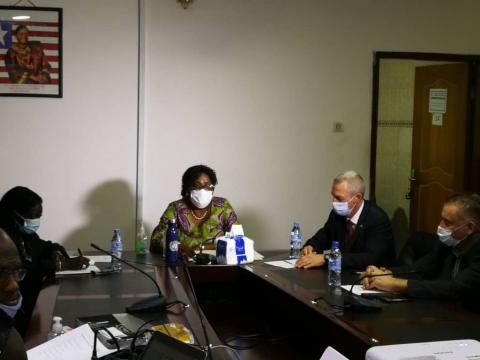By Mabinty M. Kamara
In a bid to ensure maximum benefit of the extractive sector for its member countries, the Mano River Union (MRU) has launched a regional approach to the Kimberly Process and Artisanal and Small Scale Mining (KP-ASM).
The KP-ASM is an offshoot of the Kimberly Process Certification Scheme (KPCS), which came into being during the civil wars in the region, as a response to the so-called ‘Blood Diamond.’ The scheme provides a platform for the certification of minerals before they leave their countries of origin to avoid the sale of what has become known as conflict diamonds.
The regional approach, which is funded by the German international development agency, GIZ, aims to improve law enforcement and better secure the production from mining to export, as well as to secure government revenues and ensure greater beneficiation of diamond mining communities within the four MRU countries of Sierra Leone, Guinea, Liberia and Cote d’Ivoire.
The Kimberly process is a multilateral international trade regime that was established in 2003 and brought together government, world diamond industry players and civil society coalition, with the goal of preventing the flow of conflict diamonds.
The European Union and the four MRU countries are part of 55 countries in the world that are members of the Kimberly Process.
The launching ceremony of the KP-ASM was held at the MRU Secretariat in Freetown on the 22nd of September.
During the presentation, Ahmed T. Diallo, MRU’s Program Officer Mines, Energy and ICT, noted that the first phase of the initiative, which costs €1million, lasted for 12 months: 2017-2018. He added that second phase, which is worth €3.8million, is aimed at strengthening the capacities of national governments to effectively implement the KP-ASM, better regulate artisanal mining and capture revenue in line with the Africa Mining Vision and the regional interventions and policies agreed by the four MRU countries.
This second phase, according to Mr Diallo, also entails the establishment of network platforms that comprises all key stakeholders, particularly the Civil Society, to contribute to compliance with KPCS standards and create better conditions for artisanal mining within the MRU.
Also covered by the second phase is effort to improve reporting system on diamond and gold export, to be developed via enhanced data collection and utilization of statistics to strengthen traceability and license administration.
In a statement, the MRU Secretary General, Medina Wesseh, noted that the mandate of the Union is to promote socioeconomic development, maintain peace and security and foster the sub-regional integration of its member states. She added that the body was specifically focused on remote, rural and border areas where poverty and instability drivers are visible and endemic.
According to Ambassador Wesseh, the regional approach of the KPCS is an instrument initiated by member states for stakeholder sensitization and awareness, operational capacity building, Regional Corporation and information sharing, amongst others.
“We are at the beginning of the implementation of this tool, but it is already recognized at the International Level as a best practice that other regional Economic Communities around the world would like to see replicated. We at the MRU are proud of that. You may recall that this regional approach to the Kimberly Process, as practiced by the MRU, came up for recognition by the UN assembly in March 2019 in the United States,” she explained. She therefore called for effective media participation and involvement through partnership for the success of the initiative.
“The MRU Secretariat considers the media as allies in this process. We are eager to partner with the media, in order to disseminate information and create awareness amongst the citizens. We commend the Pivotal role of the media in this direction as a sensitization tool. We look forward to concretizing this with the umbrella organization of the media and with specific institutions in particular, once we have understanding with GIZ/EU partners on the communication strategy,” she said.
Gerald Haltler, first counselor, head of cooperation, Delegation of the European Union to Sierra Leone, noted that the initiative was a very important one and that it was very good that they were partnering with the MRU to achieve the regional approach. He also reechoed the call of the Secretary General for media intervention.
“I am very interested to see a little bit of how you are going to roll out the program here in the country. And also I really invite the media to develop interest and continue to follow the implementation and hopefully to work with the intended beneficiaries and to see their livelihoods improving,” he said.
Copyright © 2020 Politico Online








